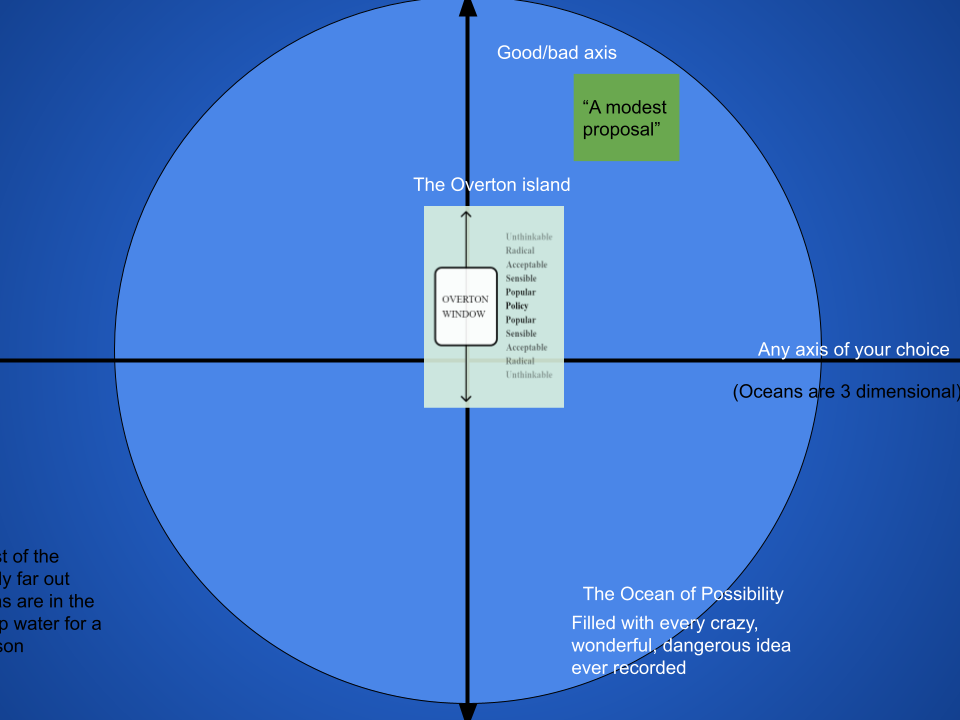Cultivating greener grass outside the overton window

Firstly, I think this idea carried to its fullest extent has a very low probability of success. That being said, the potential rewards, alternate uses and relatively low costs still make it something I think RISC would be interested in.
Basically, I think it would be worth the time and investment to make a serious effort at creating a series of counterfactuals for the structures, particularly political ones, that govern everyday life. Everyone I know thinks the government is screwed up but change seems impossible. I think unified, easily marketed, convincing and exceptionally bold alternate plans would at the very least start some conversations. I'm the furthest thing from an expert in the field, but I think it is worth a shot to put out thinktank like proposals on a massive scale. "The great American experiment" looks a little creaky, and there have been huge previously unimaginable changes in government many times before. I think that RISC should use some of its institutional clout and academic expertise to promote the best of these potential changes and flesh out the ideas to prepare them for public scrutiny.
Clearly, the idea is a little outrageously broad and ambitious. Narrowing in, I think a good place to start would be on easily explainable structural changes that are on their merits a better option than the current one, and are either already in place elsewhere or offer obvious advantages.
I could get into specifics, but I don't think I'm qualified so I'll give a potential example instead:
- I have never met someone in real life (politicians with pithy soundbites don't count) who has delved into voting systems and comes out saying that first past the post should be the main or only way that elections are run. Most people though, haven't looked into voting systems. People like me don't know what the most reasonable alternative would be, and a highly theoretical idea can only go so far. I think it would be worth the effort to put some meat on the bones of the voting systems argument. A team of researchers and experts putting out an in depth examination of costs and potential benefits of how changing the voting system would actually work and what it would require. Then, taking the report or proposal and marketing the heck out of it until newspapers wrote op eds against or for it bla bla basically trying to get it into the overton window of ideas that are seriously judged on their merits or at least publically discussed.
- marketing: people hate politicians and media loves controversy. This seems like if framed properly it could become the issue of a news cycle or two. Add in some activism, putting politicians on the spot and some luck and it could become a resurgent political discussion.
- Host some debates between proponents of current system and alternative
Potential Problems:
- "That'll never happen syndrome"
- point to massive changes in the past
- scattershot approach with many different proposals that advocate for meaningful structural change
- Using internet/activism/controversy to start small and build up
- Perceived or actual bias
- be as evenhanded as possible when describing risks/costs/benefits of alternative
- host public debates on the proposals and operate only with convincing logic or evidence of success.
- recruit prominent activists on both sides of aisle, stay away from culture war issues if possible
- Create a figurative proposal for the current system and challenge people to point to where you mischaracterized it or failed to examine the argument in an unbiased manner
- It simply isn't hugely controversial and popular in the way it needs to be
- continue to do outreach and publicity in new and interesting ways
- celebrity opinions
- Even if it doesn't become popular immediately, a collection of well researched and supported remedies for problems that are going to crop up will be useful. In this case, the focus should be on making sure the proposals are as accessible and convincing as possible. If grassroots groups or a party on the other side of the world steal the proposal? perfect, publicity and discussion are the goal.
TLDR: The government is bad in so many ways, and the current public discussion is focused on minutia and incremental change. By putting together a number of cohesive and convincing arguments for structural change in different areas, RISC could change the entire discussion in some areas. Most of these proposals won't work, but if they have sufficient public impact, they might spur some amount of change. Or, alternatively, these proposals could simply prove a reasonable counterfactual that over time might shift the overton window in the right direction.


Comments